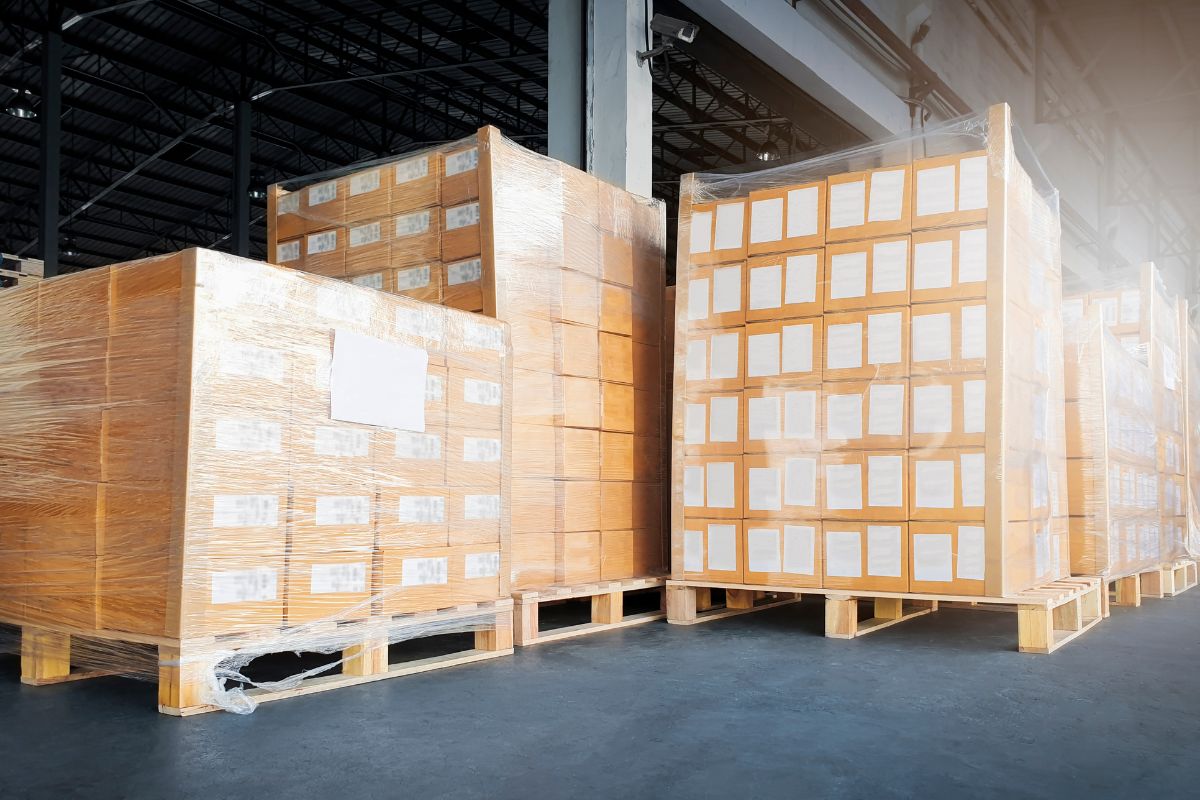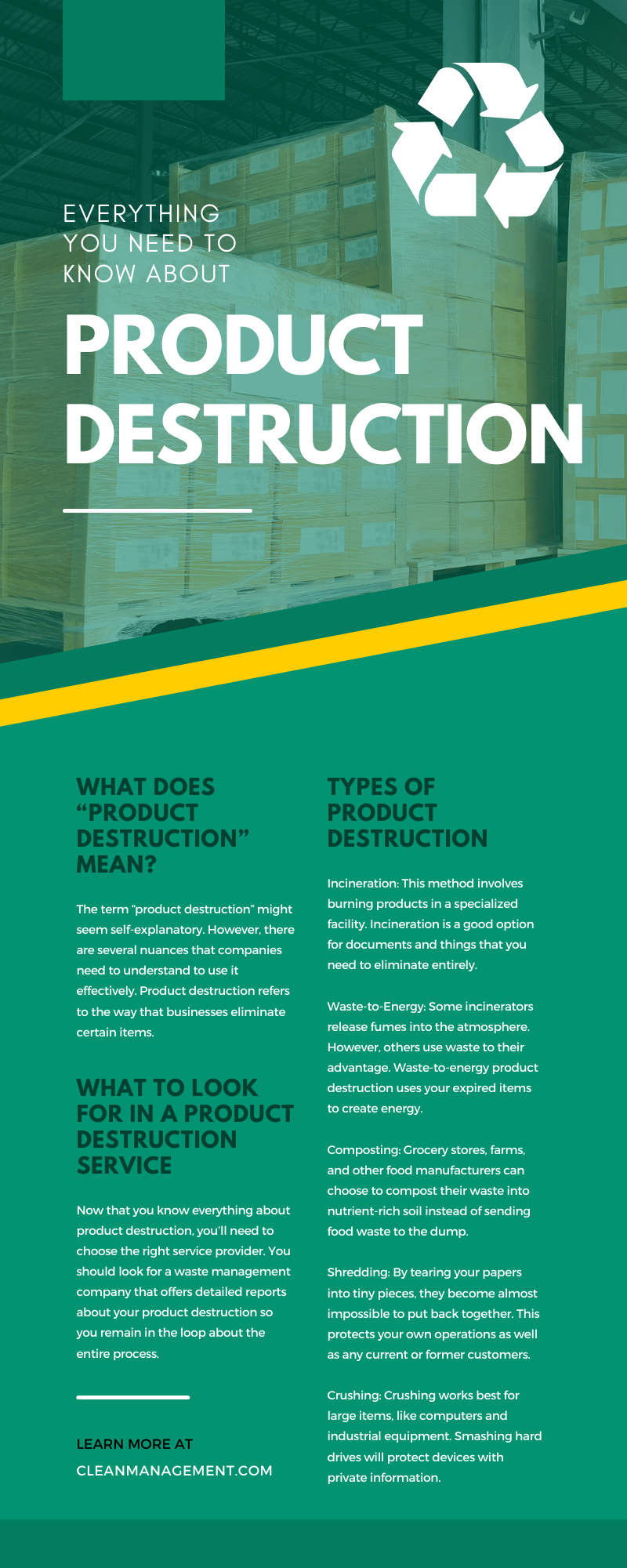Everything You Need To Know About Product Destruction

People don’t usually think much about their garbage once it leaves the facility. After professionals remove your waste, everything is “out of sight, out of mind.” However, you should care about what happens to your unused products.
Secure product destruction is essential for businesses. You want to ensure that all of your confidential information stays safe, even after it leaves your establishment. Even items lacking critical data should go through the right destruction process. Learn everything you need to know about product destruction so you can incorporate it into your business practices.
What Does “Product Destruction” Mean?
The term “product destruction” might seem self-explanatory. However, there are several nuances that companies need to understand to use it effectively. Product destruction refers to the way that businesses eliminate certain items.
Destroying products is more than tossing them in the dumpster; it’s the complete destruction of items that are expired, damaged, or otherwise unsellable. It also ensures that private documents and digital files stay confidential through every stage.
Types of Product Destruction
It’s not uncommon for businesses to wind up with unused items. Depending on your budget, access to services, and the materials in the products, you have several destruction options.
Using a waste management company will ensure that you choose the proper method for your circumstances. Let’s explore the different types of product destruction so you can choose the right method for your operations.
Incineration
The first way businesses destroy their unsellable items is through incineration. This method involves burning products in a specialized facility. Incineration is a good option for documents and things that you need to eliminate entirely.
However, not all items can go through incineration. Products that don’t combust safely aren’t eligible for safety reasons. Likewise, substances that produce toxic fumes will need a more environmentally friendly alternative to incineration.
Waste-to-Energy
Some incinerators release fumes into the atmosphere. However, others use waste to their advantage. Waste-to-energy product destruction uses your expired items to create energy.
Plants can harness heat or electricity from burning waste to power their facilities. Doing so allows these establishments to use less energy and reduce their carbon footprint. It also helps cut utility costs while removing debris from the environment.
Composting
Another way businesses can destroy unsold products is through composting. This method works best for organic materials. Grocery stores, farms, and other food manufacturers can choose to compost their waste into nutrient-rich soil instead of sending food waste to the dump.
Many things can be composted—even some hazardous waste! Natural compounds can break down into healthy substances that replenish the earth. This is a better alternative since you can actively improve the environment while removing rotting organic waste from your premises.
Shredding
Waste isn’t always decomposing food or mountains of plastic. Sometimes, waste looks like boxes full of outdated documents. While these papers might be old, they can contain valuable information about clients and your business.
People can weaponize this data if it falls into the wrong hands. Shredding your files eliminates this risk. By tearing your papers into tiny pieces, they become almost impossible to put back together. This protects your own operations as well as any current or former customers.
Crushing
What do you do with items that you can’t burn, shred, or compost? The best alternative in this scenario is crushing. Instead of letting your items take up space in your facility, you can crush them and render them unusable.
Crushing works best for large items, like computers and industrial equipment. Smashing hard drives will protect devices with private information. Destroying appliances and industrial tools keeps people from repurposing unsafe equipment.
What Products Should You Destroy?
Certain products are ineligible for off-spec product destruction. Federal and local entities regulate some forms of hazardous waste that could potentially harm others. However, products that pass these guidelines can undergo various forms of product destruction.
So, what kinds of items should your business destroy? We’ve already covered expired food, computers, and documents. However, there are many other types of products you could get rid of more efficiently, including, but not limited to:
- Expired hand sanitizer
- Damaged retail items
- Out-of-style clothing and fashion items
- Products that don’t pass quality inspections
- Expired aerosols
Who Benefits From Product Destruction?
Some businesses ignore product destruction because it seems too complex. After all, who cares where your garbage goes once you throw it away? The truth is that many groups, including your own company, can benefit from efficient product destruction.
The Environment
Some forms of product destruction, like composting and waste-to-energy, have obvious environmental perks. Composting organic materials like yard clippings, food, and compostable paper put nutrients back into the soil for farmers to use to grow more produce. Likewise, waste-to-energy incineration helps reduce energy waste.
Every product destruction method works to keep whole materials out of landfills. Shredded papers and crushed appliances can go through recycling and find new life. The goal is to eliminate commercial waste without introducing it back into the environment, where it will wreak havoc.
Consumers
Destroying your off-spec items also benefits consumers. Sometimes, products fail quality control checks when they do not meet standards. You might think that tossing these things keeps them out of the hands of your customers.
In reality, scammers often acquire your off-spec products and resell them for profit. Destroying these unsellable items ensures that your clients aren’t using defective items. Products fail inspection for many reasons, including safety, so eliminating them completely helps protect consumers.
Your Business
Finally, using product destruction services is beneficial to your business. Demolishing unused items helps protect your name. You don’t want to be associated with things that fail to meet your standards and don’t adhere to your company values.
The scammers who sell off-spec items do so under your brand name. When a customer is unhappy with a product you should have destroyed, they may associate the negative experience with your business. Product destruction ensures that you’re only advertising high-quality goods.
What To Look For in a Product Destruction Service
Now that you know everything about product destruction, you’ll need to choose the right service provider. You should look for a waste management company that offers detailed reports about your product destruction so you remain in the loop about the entire process.
Your product destruction service should have a history of reliable work, efficient transportation routes, and competitive pricing. If you’re looking for a business that checks all of these boxes, look no further than Clean Management Environmental Group. We have decades of knowledge and hands-on experience, so you can relax knowing your off-spec items are in good hands.

